At least as far back as the 18th century, brining was a common way to preserve meat to make sure it wouldn’t go to waste. It became popular in the age of sail due to its ability to preserve meat for years, rather than the short-term preservation of other methods. Brined meet didn’t have to be kept cold, and it let people enjoy meat all year round without needing any complicated processes.
Brining was a minimalist method for preserving meat back then, and is still used today for that very reason. Why fix what’s not broken? The simplicity of the process, as well as the availability of the necessary supplies, makes this a popular choice among preppers, large families, and anyone who is tired of meat going bad before being able to cook it. That’s the upside.
The downside, if there is one, is that the salt content of the meat after it has been brined is quite high. So, people who need to cut back on their salt intake should use caution with brined meat. However, that doesn’t mean they can’t eat it. Soaking the meat in plain water for an hour or so, then rinsing it before cooking, will help reduce the salt content.
I like pork, and will be using pork for this article. However this process can be used for a variety of meats, as well as fish.
The Supply List
No need to write this down, because the list is very short and sweet. In its simplest form, you will only need:
- Meat
- Salt
- Container (glass or ceramic works well)
- Sharp knife
- One fresh egg, fully intact (for testing water only)
- OPTIONAL: additional seasonings
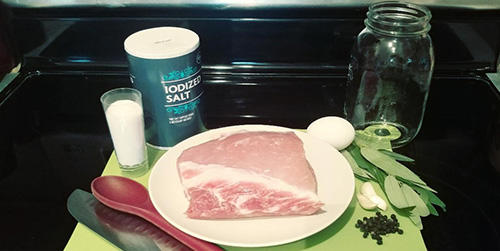
I have additional seasonings listed as “OPTIONAL” in the above list. But, if you are like me – someone who just can’t seem to leave a recipe untouched – it’s not much of an option.
There are several variations and groupings of seasonings you could use, all depending on your likes and dislikes. Some suggestions are sugar, black peppercorns, bay leaves, garlic, or any of your favorite combinations, such as Asian spices.
Related: How To Can Pulled Pork
The Process of Brining Pork
Once you have the supplies, the first thing is to make sure the container and meat are clean. Then, proceed with the following steps:
#1. Cut the meat into cubes, about 1-2 inches each.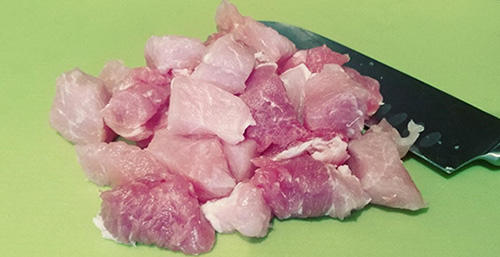 #2. Rinse the meat well with water to fully cleanse it, and set aside.
#2. Rinse the meat well with water to fully cleanse it, and set aside.
#3. Add enough water to the brining container of your choice to allow room for the meat to be added later and be fully submerged.
#4. Add the salt (the amount will be determined by the size of container). For one canning jar, I used about 1 cup salt.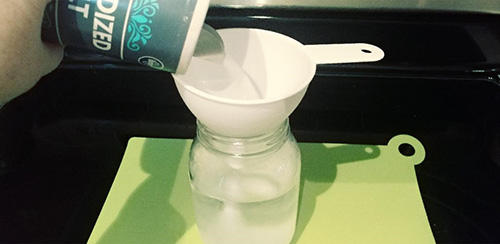 #5. Stir until the salt is dissolved
#5. Stir until the salt is dissolved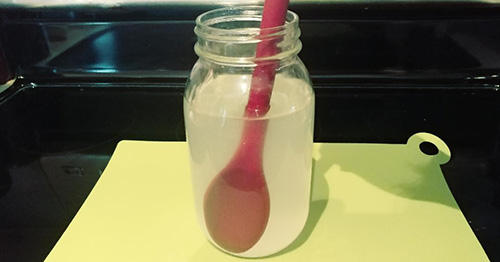 #6. Test the water to see if it’s salty enough by placing the egg in the water. If the egg floats, there’s enough salt. If it doesn’t, add enough salt until it does.
#6. Test the water to see if it’s salty enough by placing the egg in the water. If the egg floats, there’s enough salt. If it doesn’t, add enough salt until it does.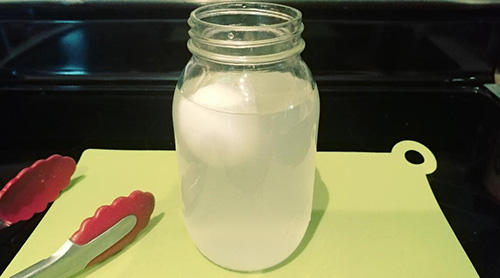 #7. Add the meat to the container, making sure it is fully covered by the salt water.
#7. Add the meat to the container, making sure it is fully covered by the salt water.
#8. If you are going to add additional flavoring, you could do it now. I added ⅓ cup sugar, 4 bay leaves, 3 garlic cloves, and about 20 black peppercorns. Keep in mind, I made a small batch.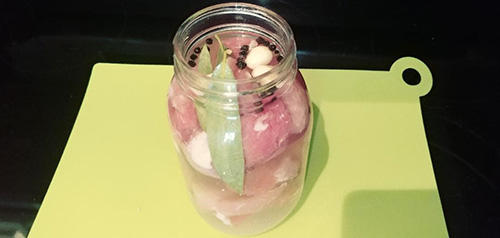 #9. Place the sealed container in the refrigerator for 1-2 weeks before using.
#9. Place the sealed container in the refrigerator for 1-2 weeks before using.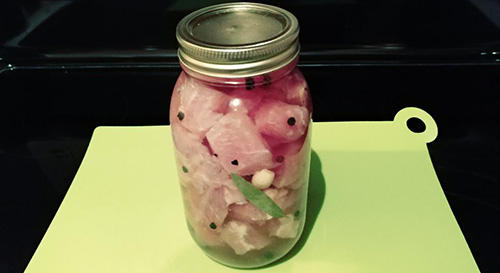 It’s hard to believe, but that’s all there is to it. So incredibly easy, yet a very powerful option for preserving meat for years. Yes, that’s right – if done properly, the meat will stay good for years!
It’s hard to believe, but that’s all there is to it. So incredibly easy, yet a very powerful option for preserving meat for years. Yes, that’s right – if done properly, the meat will stay good for years!
A word of caution though; even though it’s been preserved, the meat is still raw. Make sure to cook it properly before consuming.
You may also like:
Cheap and Easy to Build Root Cellar in Your Own Back Yard (Video)
Pressure-Canning Hamburger Meat for Long Term Preservation

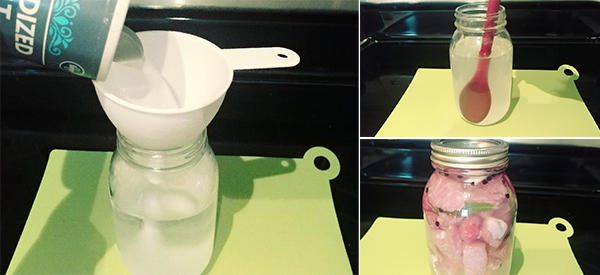




















Thanks for this post. One question though – does the brined meat have to be stored in the refrigerator?
I Have 2 Questions: First, can a large bowl of water be made up, testing with the egg, then added to fill the jars, as need be ? 2nd. Question: as the other person previously asked, after two weeks in the fridge, can the jars then be removed to a shelf in a cool dark place, for years, if need be at normal room temps ?
Think of hams that are salt brimmed, smoked and then cured for months to years.
That’s the point of brining meat, it doesn’t need to be refrigerated. When the method was common the only way to keep things that cold was by using ice gathered in the winter. Actual commercial refrigeration wasn’t economically developed until the end of the 19th century.
No. In the days of wooden sailing ships they brined their meat in wooden barrels to feed the crew. No refrigeration was available. Meat preserved this way lasted for many months…
Make sure the egg is fresh and sinks quick in unsalted water first. In other words test the test egg. I’ve had many eggs out of the carton float when I’ve went to hard boil them. No salt was added to the water.
This would be a real case of “one bad egg” spoiling everything! (Because it wouldn’t tell you to add enough salt)
This recipe says “The Process of Brining Pork.” Is this also applicable to other meats, as well? Or is there different processes for different meats? Why is it necessary to refrigerate if this process was used long before refrigeration was an option?
I see one thing wrong with this picture already, You show a picture of the salt container it has Iodized salt written on it , You don’t use Iodized salt for pickling , You use plain ordinary salt, or pickling salt, Iodized salt has Iodine in it you dont want that.
Can you cook the meat and brine it?
I think the simpler way would be to pressure can it. All the seasonings you normally like (including salt) could be added to that. No need to refrigerate then.
I totally agree Cathy. Fully cooked and ready to eat at any time.
make sure you doit right or it will kill you though! botulism is a neurotoxin and its deadly!!! must use a pressure canner not a regular canner and even veggies need enough citric acid or salt!
A comment on everybody’s favorite “pickled meat”, CORNED BEEF BRISKET (or round), would be in order here. Salted and flavored, it’s everywhere (and St Patrick’s Day will be here soon).
You show Iodized salt, for pickling, You should use pickling salt, not Iodized
Thank you for clearing this up.
I always understood that the reason for avoiding iodized salt for pickling was appearance–the water will be cloudy. Pickling salt simply has nothing else in it. (I assume pink salt would also work–I’ve always wondered whether that would be cloudy as well, due to its mineral content.)
Pink salt has sodium nitrate in it and not wise to use large amounts, only small amounts
I think Rhonda was referring to pink Himalayan salt not pink quick cure (sodium Nitrate/Nitrite) salt.
Does the jar need to be boiled and sealed like you do for canning?
I did not write this article, but after canning with my (Morom) Grand mother…remember 5 acres and independence and food for 1 year. “Yes.”. Always, always be safe. Hot water in our world is available. Sterile is always better. Happy Holidays.
Barber, waste of time, no responding.
How many ounces is a canning jar?
@Pke They come in different sizes and you would use the size YOU are comfortable with and that’s big enough to handle the amount of meat you are dealing with. Up here in the GWN (great white north…LOL!) I think they range anywhere from 250 ml to 1.9 litres. If you’re not used to metric just use conversion tables found on the internet.
Most of the canning jars I have seen are one pint and one quart. I believe, however, from some sources one can obtain 1/2 gallon and one gallon canning jars.
You can also get 1 1/2 pint size jars.
Is non-iodized salt the same as “canning” salt?
Canning salt is kosher salt.
How are you sealing jars for long storing on shelf? Can you add onion to mixture?
My Depression Era daddy used to LOVE commercially canned pickled pigs’ feet.
I’m not really crazy about corned beef. However, if you are ever in a meat poor situation, I’m thinking they both would taste real good.
Pickled. Pig’s feet with hot sauce! ?
Messing around with raw meat, ESPECIALLY pork, scares the heck out of me. I’m not a pork person and try and stay away from that garbage as much as possible. I’m not a particularly religious person but the Bible, which is supposed to be our holy book, says not to eat pork as hogs are a diseased animal. There’s GOT to be something behind that. Because of the biological similarities between each other, pigs can harbour a range of parasites and diseases that can be transmitted to humans. These include trichinosis, Taenia Solium, cysticercosis, and brucellosis. Pigs are also known to host large concentrations of parasitic ascarid worms in their digestive tract. Some strains of influenza are endemic in pigs. Pigs can also acquire human influenza. I just read that somewhere in the world there’s another pig epidemic going on. Probably China but I’m not sure. That’s why I stay away from pork. Having said that I wonder if it’s possible to “pickle” beef using cooked beef and vinegar with the appropriate spices and maybe sugar thrown in for good measure as sugar is supposed to be just as good a preservative as salt. And then put it into a sealed mason jar piping hot. If it is possible then you’d end up with something like Sauerbraten which is absolutely delicious and which I COULD handle. And over time the vinegar would help to further tenderize the meat. Hopefully not TOO much. Yum, yum good! Another experiment I have to try. BTW, my little pickled egg experiment turned out quite well and I try one of them every once in a while. Delicious and no problems even after a year. Next time, though, I’ll use white vinegar instead of ACV. ACV is a bit strong for my poor old stomach. Thank goodness I put sugar in there to help cut the taste of the ACV.
Actually it was good sound advice then, but the disease you are worried about is Trickanosis (spelling?). There are two ways around that first a temp of 170 degrees kills it. Also, today with modern farming methods ((store bought) if you buy from a local farmer that is lax in his cleanliness),well… the disease is consider dead here in the U.S. hope this helps.
2nd, sorry you did write a lot about concerns, I said that Pork was safe here, we are now importing from “Our Newest Best Friend in the Whole World China.”. Read your labels. The diseases you are concerned with I believe are Not Dead in other parts of the world.
Also Swime Flu tends to come from oriental countries (no finger pointing here). Birds (I.e. chickens, can and do pass their diseases on to pigs and humans). Pigs then get sick and the disease tends to mutate and jump to….humans.
Armin: Bear meat, pig/hog and surprisingly, dog meat all can contain trichinosis. They are edible but must be cooked thoroughly before eating. So, if Ole Yeller is on the menu, make sure you cook him thoroughly before serving him. In an EOTW situation, you are not going to be able to pick and choose as one can now. If you are lucky enough to kill a feral hog, you will be in hog heaven (pun fully intended). I have read that the best method of cooking such animals is for a long time over heat high enough to bring the water to boiling. Eventually such cooking will kill whatever parasites the animal was harboring.
My father also greatly enjoyed pickled pigs feet. I never developed a taste for them myself.
I appreciate all your responses to my concerns about hogs but it’s not only trichinosis I’m worried about, it’s also all the others I’ve listed. These diseases may be considered dead in the US but what about the rest of the world and especially China? “Our new best friend”. Yeah, right. Let’s just say I’m not a fan of the Chinese and leave it at that. Pigs ARE a diseased animal and many times the flu does start in China or some other eastern country because they do raise poultry and hogs together. And then the flu jumps species and then we end up with it. BTW, China raises the most pigs and the Chinese consume the most pork in the world. Take from that what you will. They say you are what you eat. Our store bought pork is chock full of antibiotics out of necessity. In an EOTW sit. I may be forced to eat whatever I come across, bite the bullet so to speak (ha ha), and you can be darn sure I would cook the crap out of it. Just as an aside, Rydaartist, I’m assuming you mean 170 degrees Centigrade. Just to be clear. Which is about 340 F. I would cook it closer to 180 C which is closer to 360 F. And of course when you cook pork long enough it gets that wonderful crust on it and it looks and smells delicious but I choose not to eat it and that’s my choice. I’ve long wondered if many of the illnesses that we come down with are caused by what we choose to eat. And as strange as it sounds pigs are biologically very close to humans and it’s almost like eating one of our relatives. LOL! And, Chuck, I’ve also heard the same thing about some wild game including bear. And if you’re lucky enough to take down a bear, again you have to cook the “crap” out of it. Sort of like the old joke about cooking kidneys. You have to boil the “piss” out of them. I know. Bad joke. If I’m lucky enough to acquire the few acres that I need then I’m seriously considering raising Flemish Giants (rabbits) and Rhode Island Red chickens as my meat source. Also the eggs of course. Lately for beef I’ve come across cattle known as Lowlines? I hope I have the name right. They’re basically dwarf cattle and much less resource intensive as opposed to full size cattle while still packing a good amount of beef on them. One or two dairy cattle would be much more important to me than beef cattle although I do love my steaks. In the end, what it comes down to is that we all have to make our own decisions as to what we choose to eat and no one can be faulted for their choices. In a true EOTW sit. all those rules may go out the window and that kind of scenario chills me to the very core. I cannot even imagine what a worldwide crisis of that sort would be like. It does scare the very bejeesus out of me and I’m not ashamed to say that. If you think I’m a little weeny because I feel like that then that’s your opinion. You can apply adjectives like horrific or abominable or appalling to a world wide grid down situation but nothing in our experience will prepare us for the reality, if and when it does actually happen. It almost makes me physically sick just to think about it. Again, I hope to god we never have to experience it. Humans are capable of almost anything when it comes to their own survival. We have a very dark side to us. And if we have 7 billion or so people that are really starving it could very well usher in a new “dark ages” where people will do unspeakable things just to survive. Shows like the “Walking Dead” just give people bad ideas and don’t help the matter. I was able to make it through half an episode of the “Walking Dead” and then I HAD to turn it off. To me almost a demonic show. If “IT” does come to pass then I pray for divine intervention because then that’s the only thing that will save us. Or do we deserve to be saved? Let a new broom sweep clean? Then a reboot with the hope that we learn from our past mistakes and not repeat them? Either way we have an interesting future ahead of us. I do wish all of you the very best. Merry Christmas and a joyous New Year! God bless you all.
Armin: I’m pretty sure in an end of the world situation you won’t have to worry about pork being imported from China or anything else, unless it is Chinese troops landing to “help us in our emergency.”
When I was a kid, many years ago, Henry Jankowski was a pig farmer and he used to pick up the food garbage. His drivers wouldn’t take anything but food scraps. If there was paper in it or cans or anything else, it got dumped on your front lawn. Of course in those days we didn’t have the vast amount of trash we have today. We used to burn our trash, tin cans, paper other than newspaper that couldn’t be repurposed, cardboard (unless there was a rag picker who came around and he would take cardboard). When the incinerator got full it was loaded into a galvanized can and taken to the township dump. You know, the place were we used to go to shoot rats with a .22 in the evening.The township dump was also the place where one took old furniture that even the junk dealer didn’t want and old tires — everything that would be thrown away.
Anyway, continuing with Henry Jankowski, I am pretty sure his pork had to be cooked thoroughly. We are not talking about 170 °C, but 170°F. While the oven may have a temperature of 375°F, I am pretty sure the interior temperature of the meat isn’t that high. My meat thermometer only measures to 190°F and that is marked for poultry. Pork is 170 and ham is 160°F. I have a feeling that if you cooked pork until the internal temperature was 350°F it would be way overcooked and encrusted with charred outer crust.
With all the food choices we have presently, one can be choosy about what one eats. In an EOTW situation we will not be able to be so choosy. As you stated, I am preparing but hope it will be for naught. I’m too old for that kind of exercise.
The Bible and Jews don’t like pork because of exactly what you said, when uncooked, or not stored properly it can harbor parasites – think Bible times, salt was a commodity and refrigeration (even ice) was null. Meat would go bad quick, especially pork.
Pigs do not sweat, therefore, they harbor a lot of toxins. They also will eat ANY animal, including humans. They also scavenge, and animals that scavenge aren’t “clean” (that is why crabs, lobster are not ‘kosher’, because they eat off the ocean floor where all the poop goes), neither are rabbits because they will eat their own poop. Any animal that does that isn’t ‘clean’
Not Jewish, but have read a bit about what animals aren’t kosher
It really is too bad, because I LOVE bacon!
I am not sure I would call salt grime “Pickling” as much as “Haming.”. Look at Pickled Pigs Feet. salt and vinegar, look at pickles of any kind, salt and vinegar.
Also look at Julia Child’s Recipe of making your own Ham and Corned Beef. adding Pckling Spices can make a salt brimmed meat (which can be bland) exciting. Your last remark,about freshing your meat by a single rinse is rather simple. I am old enough to remember real Finnan Haddie, salt smoked, that was rigid with salt and drying. But you might want to increase your fleshing tome to more than one rinse (I also reme,ber “Real Ham”). Happy Holidays.
With regard to pickling beef, I went to Wikipedia and researched a little on brining. We all remember about WWI and WWII and the British troops complaining about bully beef. Well, according to Wiki, bully beef is simply brined or corned beef canned. There was an extensive bit about the potato famine in Ireland and how it was brought about. There was also an explanation about corned beef and why it is a popular Irish dish. Corn, apparently is an Old English word for something that is like a small kernel. The salt used to make corned beef was called “corn” so the real term is salted beef.
If you are interested in more detail about salted meat, I would recommend the Wikipedia article.
Corn was the size of salt. Actual ears of corn came from Americas. So eared corn was named after the salt kernel size, as corned beef was already an old item in Europe.
What’s the point of brining if you have to put it in the refrigerator anyway???
Just a few points from my days working along side my father as a butcher’s assistant and homesteader. First off, ALWAYS freeze or pressure can any meat, fish or poultry you intend to keep long term. And, if possible always add Prague Powder (Instacure#1) NEVER try to water bath can any meat, fish or poultry product outside of rendered fat or broth. You can’t get the contents of your jars hot enough long enough to kill all the dangerous/poisonous organisms. My parents pressure canned everything but fruit, lard and broth.
Wild bear is more parasite prone than pork, though the main reason for pork being considered ‘unclean’ was that at the time the kosher dietary laws were formed, it was impossible to be sure pork had been cooked long enough at a high enough temperature to be safe to eat. The same is true of most of the ‘unclean’ animals mentioned in the dietary laws. Wild Bear is now the worst offender in North America, especially in regard to tricinosis (?). Dad’s guideline was to ‘season it like beef but cook it like pork’; mainly to cook it thoroughly. Cooking and eating kosher is a good idea even in this modern world. Which means keeping foodstuffs as clean and fresh as possible. My Dad has thrown out cured bacon slabs that didn’t “smell right” and read the riot act to a man who insisted one of his brined hams was all right when we found it spoiled around the bone–the ham had a huge blood clot in the middle from the pig being shot in the butt. (We found the bullet when we were slicing the ham into steaks and yes, we cleaned all the equipment with bleach before we went any farther.)